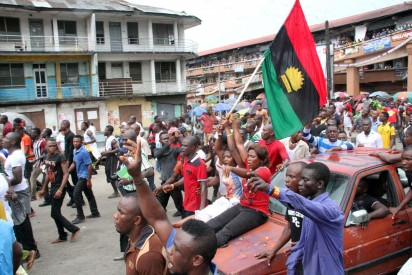
Buhari revealed that he would gladly negotiate with Boko Haram who declared an Islamic republic and gave them a bloody nose… Why then did the president not at least consider dialoguing with members of the Biafra agitation group to at least find out the root causes of their agitation?

Biafran agitators
I closely observed President Buhari’s countenance change from cool to aggressive on yesterday’s media chat the moment Nnamdi Kanu and Biafra were mentioned. More so was the fact that he justified Kanu’s continued detention despite court orders to the contrary. It would seem that he already marked down Kanu as a coup plotter who conspired to overthrow his regime and so must receive the maximum sentence.
Same can be said on social media whenever the Biafra question arises. You get to see many negative sentiments expressed especially from non-Igbos, a sense of extreme revulsion to say the least.
I have pondered on this issue and one question keeps on coming up; why is the Biafra agitation seen as the worse form of crime in our statute books? Some would argue that the Biafran sentiments would evoke war which the nation cannot deal with now. Good. But Nnamdi Kanu and his IPOB followers have been largely demilitarised. I am yet to see any of them carry arms and ammunition against the state. Of course IPOB’s sister group MASSOB has from time immemorial defined their movement as largely non-violent.
In the same media chat, the president revealed that he would gladly negotiate with Boko Haram who declared an Islamic republic and annexed parts of the North East to their growing caliphate until the Nigerian military gave them a bloody nose, sending them scampering for safety. Why then did the president not at least consider dialoguing with members of the Biafra agitation group to at least find out the root causes of their agitation?
History tells us that the Biafran state was a child of necessity, born because a section of the country felt they were no longer welcome, with the continuing massacres of their people in the North. After the war ended and the last shot fired, has Nigerian state actually addressed the root causes that elicited the Biafran insurrection in the first place? How well did Gowon’s 3-Rs policy fare? 45 years after the war, have Igbos been really properly re-integrated into the fabric of the Nigerian nation? Can one of the Igbo ethnicity actually successfully run and win the presidency in Nigeria? Can Igbos actually be appointed to head some ‘’posts’’ which have for decades been an exclusive reserve of a section of the country?
These questions raised above have been asked by Igbos across the country. To be fair to past Nigerian leaders, some of them had tried in their little way in assuaging some of these feelings. Shehu Shagari’s masterstroke of choosing Ekwueme as Vice President and granting Ojukwu a state pardon in 1982 earned him great support from ndigbo. Same for Ibrahim Babangida who amongst other things, made an Igbo town, Asaba, the capital of Delta state despite opposition from several quarters.
At the beginning of the 4th republic, ndigbo as well gave massive support to the then ruling party, PDP despite the fact that their kinsman, Ekwueme was jettisoned by the military at the 1998 primaries in favour of Obasanjo. Even Goodluck Jonathan, an Ijawman garnered unprecedented support from ndigbo because he gave them a sense of belonging in his government. This was despite the fact that he did not do much in terms of infrastructure for the region.
Coming back to the Biafran agitation, Nnamdi Kanu and his Radio Biafra had long existed before the Buhari regime and had been broadcasting since 2011 or thereabouts. I had maintained in the past (and still maintain) that the way and manner the Buhari Government handled the Biafran issue made it spiral out of control. Radio Biafra transmissions had been largely ignored by a large section of ndigbo and Nigerians by extension, till the Federal Government stirred the hornet’s nest. Arresting Nnamdi Kanu was also a massive blunder which has now turned him from a relatively unknown radio broadcaster to a freedom fighter recognised not just by the country but also abroad.
Buhari’s near exclusion of the South East from his appointments also further fuelled the agitation, portraying him as a man who hates ndigbo.
Just as Gowon’s use of force to quell the so called ‘’rebellion of the secessionists’’ hardened the stances of Ojukwu and the 1960’s Biafrans to fight for their cause, so is Buhari’s clampdown on Radio Biafra, IPOB and MASSOB emboldening the members, many of them so young they weren’t even born till 2 decades after the war ended!
My advice for the Buhari regime is to be conciliatory rather than retributive in handling the Biafran issue. He must learn to portray himself as the President of all and not just of a section of the country or a particular political party. Like Shagari and Yar’adua he must sue for peace. Let him invite the agitators to a round table and discuss the issues bothering them. If he doesn’t want to, he can delegate his Vice President or another high powered Igbo in his cabinet to do so.
Trying to suppress the movement will only further cause the Biafran ghost to linger and haunt our landscape. Those that think Biafra is dead are wrong. It is a spirit which will never die till the Nigerian Government appeases it; same way an ogbanje or abiku will continue resurrecting till the appropriate ritual is done to exorcise it.
©Copyright 2015 Nonso Ndibe


